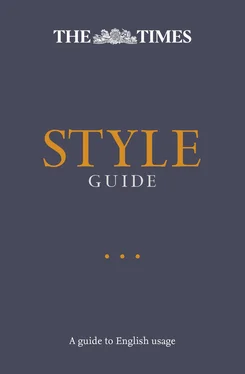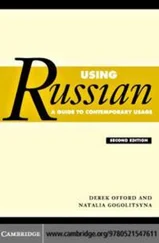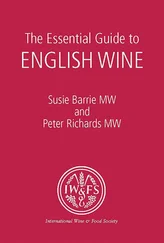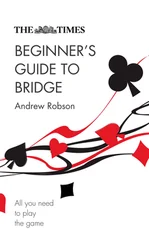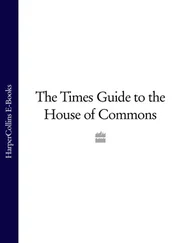All Souls CollegeOxford (no apostrophe)
all-timeavoid as in all-time high; use highest or record high instead
al-Qaedathus, hyphen and ae
alsatianlower case, the German shepherd dog. See dogs
alternate(adj) as well as being English for “every other” or “every second” in a sequence, is also American for alternative . This latter use is to be resisted, firmly, although we may need to concede that alternate history has gained more or less universal currency to denote the “what if” school of fiction that imagines, eg life in a Britain occupied by victorious Nazis after the Second World War
alternativeof two, choice of three or more, but there is no need to be obsessive about this
alternative vote(AV) system; note also first-past-the-post system
alumnusa (singular, male) graduate of a particular educational institution; alumni is the plural, including for mixed groups. The female equivalents are alumna and alumnae
ambassadorlower case even when specific (see capitalisation); the French ambassador; “he was appointed ambassador to Japan”
ambienceprefer to the French spelling ambiance
Amendmentspell out and upper case for clarity in relation to the US constitution, eg the First Amendment, the Fifth Amendment etc
Americanismsgenerally to be resisted, unless they have clearly passed into standard English use
American spellingsallow US spellings for proper names of institutions, well-known landmarks etc. So Lincoln Center, World Trade Center, Labor Day, Medal of Honor, Pearl Harbor etc; in practice this means US spellings may be retained in proper names used with initial caps, as it will be clear what is going on; job titles that in our style become lower case (ie almost all of them) should be anglicised (the secretary of defence etc, so that they do not just look like spelling mistakes); for all other words use English spellings.
Be aware that the differences are not all as obvious as writing theater for theatre or missing the u out of words such as colour ; eg US usage does not double the final l of the root verb in forms such as traveller, cancelled, fuelled, modelling etc; license is both verb and noun in US English, and so, confusingly, is practice; avoid all of these and be ready to change them in agency copy or quotes
America(n)/USin general, try to use American as in “American cities”, “American food” etc; but US in headlines and in the context of government institutions, such as US Congress, US navy, US military operation. Never use America when ambiguity could occur with Canada or Latin America
amidnot amidst; similarly among , not amongst
amoknot amock or amuck
ampersanduse in a company name if the company uses it
amphitheatresin classical context are oval or circular (eg the Colosseum in Rome); do not confuse with theatres , which are semi-circular or horseshoe-shaped
Amsterdam treaty(lower case t), but the Treaty of Amsterdam
analoguein all contexts, noun and adjective
anathemameaning accursed, consigned to perdition; there is no need for an article, thus: “It is anathema to me.” Although a noun, it is quasi-adjectival in usage
ancestorstrictly means a person from whom another is directly descended, especially someone more distant than a grandparent. Do not use in the looser sense of predecessor; eg Queen Elizabeth I is not the ancestor of the present Queen. An ancestor is not a descendant, so do not mix them up
ancient Briton/Britainancient Greek/Greece, ancient Egyptian/Egypt, ancient Roman/Rome, the ancient world; seems fine to lower case the a on ancient but cap the national adjective or noun
and alsodo not use together
androgynousnot androgenous in reference to having both male and female characteristics; androgenic refers to male hormones, eg testosterone
aneurysmnot aneurism
angioplastyis a procedure carried out by cardiologists and is not surgery
Angleseynever Anglesea
anglicise, anglophile, anglophobe, anglophoneall lower case
angstroman, lower case
animalscap proper nouns or adjectives derived from them when naming breeds of animals (or species of birds): Indian elephant, Nile crocodile, Bengal tiger, Arctic tern, Dartford warbler, African grey parrot, Bewick’s swan etc; otherwise all lower case. When referring to individual animals in stories or captions, use “he” or “she” if the sex is definitely known or if the creature is called by a masculine or feminine name (eg Felix the cat had only himself to blame). But use “it” if sex is unspecified or irrelevant. On the racing pages, horses are always “he” or “she”. See anthropomorphism
annexenoun, but to annex verb
anniversaryby definition, is the date on which an event occurred in some previous year. So avoid such nonsense as the “nine-month anniversary” or the “300-day anniversary” of something
answerphoneor answering machine
Antarcticaround the South Pole, Arctic around the North: capitalise, spell correctly and do not mix up
antennaeplural of antenna in zoological sense; antennas in radio or aerial sense
anthropomorphismthe lazy option in captioning photographs of animals; try instead to convey some real information about the creatures or the photograph
antiin compounds, generally no hyphen (unless hideous or confusing without) but always hyphenate before a capital letter, eg anti-American
Antichristinitial cap, no hyphen
anticipatewidely (and acceptably) used to mean expect ; better, however, to preserve the senses of to foresee something and react (to anticipate a blow), or to do something before the due time (so that to anticipate marriage is quite different from expecting to marry)
anticlimaxno hyphen
anticycloneno hyphen
antidepressant(noun or adjective), no hyphen
antiherono hyphen
Antipodes, Antipodeancap A when referring to Australia and New Zealand
antisemitic, antisemitismarguments have been advanced for using the unhyphenated form to mean specifically hatred of Jews, which is what is almost always intended, and anti-Semitism to denote hostility to a whole group of Semitic peoples; the distinction seems rather effortful but it reinforces our preference for avoiding hyphens where we can
antisocial
antisocial behaviour order Asbo ; plural Asbos
anti-tankone that probably looks better with a hyphen
anti-terrorismanother
antiviralone word
any morealways two words
apart fromprefer to the Americanism “aside from”
ape, aping, apish
aphelionthe point in its orbit when a planet or comet is farthest from the sun. See perihelion
Читать дальше
